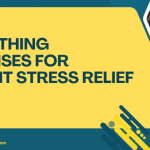Introduction
In our fast-paced world, stress seems to be an unavoidable part of life. Whether it’s due to work, relationships, or personal challenges, stress can take a toll on both our mental and physical health. Fortunately, exercise is a powerful antidote. Not only does it help in reducing stress, but it also boosts brain health by enhancing mood, increasing energy levels, and improving cognitive function. In this article, we’ll explore the top five exercises that can help you effectively manage stress and promote a healthier brain.
1. Aerobic Exercises
Aerobic exercises, also known as cardio, include activities like jogging, cycling, swimming, and dancing. These exercises are particularly effective in reducing stress due to their ability to increase the production of endorphins—often referred to as “feel-good” hormones.
Benefits:
- Enhanced Mood: Aerobic exercise promotes the release of neurotransmitters like serotonin, which can help alleviate feelings of anxiety and depression (Neuro Care Hub).
- Improved Sleep: Regular aerobic activity can lead to better sleep patterns, which is crucial for managing stress.
Recommended Activities:
| Activity | Duration | Frequency |
|---|---|---|
| Jogging | 30 minutes | 3-4 times a week |
| Swimming | 30 minutes | 2-3 times a week |
| Cycling | 30-45 minutes | 3 times a week |
“Consider finding a workout buddy to keep you motivated and accountable!”
For a deeper dive into the benefits of aerobic exercises, check out Harvard Health.
2. Yoga
Yoga is a holistic practice that combines physical postures, breathing exercises, and meditation. It is well-known for its ability to reduce stress and promote relaxation.
Benefits:
- Mindfulness: Yoga encourages mindfulness, helping practitioners to focus on the present moment and reduce anxiety about the future (Neuro Care Hub).
- Flexibility and Strength: As you practice, you’ll also gain physical benefits, such as increased flexibility and strength, which can improve body image and self-esteem.
Popular Yoga Styles for Stress Relief:
| Style | Description |
|---|---|
| Hatha Yoga | Gentle introduction to basic yoga poses |
| Vinyasa Yoga | Flowing sequences that connect movement with breath |
| Restorative Yoga | Focuses on relaxation and restorative poses |
“Even a few minutes of yoga daily can make a significant difference in your stress levels!”
For more on the benefits of yoga, visit Yoga Journal.
3. Strength Training
While often associated with building muscle, strength training can also be a highly effective way to manage stress. Lifting weights or using resistance bands not only strengthens the body but also enhances mental resilience.
Benefits:
- Increased Confidence: Achieving strength goals can boost self-esteem and confidence, which can help combat feelings of stress (Neuro Care Hub).
- Reduced Anxiety: Research indicates that strength training can lower anxiety levels and improve overall mood.
Suggested Strength Training Routine:
| Exercise | Sets | Reps |
|---|---|---|
| Squats | 3 | 10-15 |
| Push-Ups | 3 | 8-12 |
| Dumbbell Rows | 3 | 10-12 |
“Don’t be afraid to start small; consistency is more important than intensity!”
Learn more about the mental health benefits of strength training at American Psychological Association.
4. Tai Chi
Tai Chi is a gentle form of martial arts that focuses on slow, deliberate movements and deep breathing. It has been practiced for centuries and is renowned for its stress-relieving properties.
Benefits:
- Balance and Flexibility: Tai Chi improves balance and flexibility, which can prevent injuries and enhance overall fitness (Neuro Care Hub).
- Mind-Body Connection: The focus on breath and movement fosters a deep connection between mind and body, promoting relaxation.
Getting Started:
| Duration | Frequency | Recommended Style |
|---|---|---|
| 20-30 minutes | 2-3 times a week | Yang Style |
“Finding a local class can enhance your experience and help you learn from an instructor.”
For more information on Tai Chi, visit Tai Chi Foundation.
5. Walking
Walking is one of the simplest yet most effective forms of exercise. It requires no special equipment and can be done almost anywhere.
Benefits:
- Accessibility: Anyone can walk, making it an easy way to incorporate physical activity into daily life (Neuro Care Hub).
- Environmental Connection: Walking outdoors, especially in nature, has been shown to significantly reduce stress levels.
Walking Tips:
| Duration | Ideal Environment | Frequency |
|---|---|---|
| 30 minutes | Parks or nature trails | Daily or every other day |
“Try to vary your walking routes to keep things interesting and engaging!”
For more tips on the benefits of walking, check out American Heart Association.
FAQs
1. How often should I exercise to reduce stress?
Aim for at least 150 minutes of moderate aerobic activity each week, along with strength training at least twice a week.
2. Can exercise really help with anxiety?
Yes! Exercise releases endorphins, which can improve mood and reduce anxiety.
3. Do I need a gym membership to exercise?
No! Many effective exercises can be performed at home or outdoors without any equipment.
Conclusion
Incorporating these five exercises into your routine can significantly help in managing stress and enhancing brain health. Whether you prefer the high-energy vibe of aerobic workouts, the calming essence of yoga, the muscle-building benefits of strength training, the meditative flow of Tai Chi, or the simplicity of walking, there’s something for everyone. Remember, the key is consistency; find what you enjoy, and stick with it. Your mind and body will thank you!
“Start today, and take the first step towards a stress-free life!”
By embracing these exercises, you can pave the way for a more relaxed and healthier lifestyle. Also, look for related articles on Neuro Care Hub for more insights into enhancing your mental well-being.






